Strictly Personal
The poetics of Bola Tinubu’s palm kernel, By Lasisi Olagunju
Published
1 year agoon

Listen to Senator Bola Tinubu Wednesday last week in Abeokuta: “If you want to eat palm kernel, put a stone on the ground; put a palm nut on it, take another stone and smash it on the palm nut. The nut will be cracked and the kernel will come out.
You can see that it is not easy to get palm kernel to eat.” The Yoruba who watched how he strung his words together and the histrionics while saying what I translated above would say I have not done enough justice to how he said it. They should just forgive me.
Tinubu, super-rich city boy, must one day tell us who taught him how to crack nuts and eat palm kernels. It is intriguing that that was the imagery he used in describing his aspiration to be president of Nigeria. I must say that I thoroughly enjoyed the poetics, the rhetoric and the metaphysics of that Abeokuta outing.
Our fathers have several other ways of saying what Tinubu said with that imagery of force and devotion. They say also that a palm seed that would become palm oil must have a taste of fire. They foreclose shortcuts for the axe to the honeycomb.
Every axe that must have a taste of honey must lose more than a tooth. Tinubu remembered to add that too on Wednesday. He was a delight to watch.
At the very beginning of time, someone had a dream that he was cracking a heap of palm nuts. Where every dream is a warning, every question seen at night must be answered in the morning. The dreamer went to an elder for insights into what he saw.
He was reminded of the strength of his character but was told that he talked too much and needed to bridle his mouth. He was told that he was in a tough situation that needed tact and strategy garnished with loads of patience and composure.
He was told that he might be pursuing a goal that might not be entirely profitable – like picking and cracking nuts with diseased seeds. Senator Bola Tinubu’s latest Abeokuta declaration interests me. He was loquacious but I don’t think he was tactless. He believes he is working hard at getting the presidency of Nigeria because it is his turn.
But, he thinks his friends in his party’s government are sabotaging his efforts with the power he gave them. The man I watched in Abeokuta looked increasingly frustrated but defiant. He employed the imagery of palm nuts and two stones to describe his engagement with next month’s election. Elections are truly a palm nut-cracking process.
Cracking palm nuts is a very deep Yoruba way of coding wars and snatching victory from the jaws of hard labour. Ojú bòrò kó ni a fi ngba omo l’ówó èkùró (You don’t snatch the seed from a palm nut by being gentlemanly).
That was Tinubu’s description of the “superior revolution” he said he is staging with his candidature in the February 25 election. Tinubu understands perfectly what he is into. I am not sure his supporters do.
Still on the rhetoric and the poetics of Tinubu’s politics. His words impale; his dance steps taunt the enemy. Whenever Senator Tinubu speaks in his distinctive Oyo-Yoruba, I hear poetry in his (in)eloquence; I see verses in his allusions even as he drags his words.
He is always at his best speaking in the language of his fathers. He may be awful in singing, but he is a devastating user and connoisseur of Yoruba war lines. Where he is from, every General has a drummer, singer and chanter of words of adulation and provocation.
Tinubu, in Abeokuta, ordered his war bard, Wasiu Ayinde, to sing against his enemies: “K1, bèrè ìlù; ìlù òtè (start to beat drums, drums of war/intrigue/rebellion); pèlú àyájó nlá; àyájó nlá ni kóo gbé lé won l’órí (Seal it with a big, strong spell, place it on their heads).” My people say song goes before a war; sometimes it incites the enemy to rash defeat.
What Tinubu asked of his bard is invocatory; he asked for an invocation, a summoning of the elemental principalities to come and fight his foes. It is getting clearer that what we are watching (or about to watch) is not a ‘small thing.’
But who were/are the ‘them’ so deserving of the spell and imprecations of the warlord? And why ‘Ayajo’? Why not ‘iwure’ (blessing) for the sea of bald heads at that rally? Why imprecations and not prayers for his enemies to have a change of heart?
Tinubu’s imagery of one stone down, one stone up and a stubborn palm nut between them reminds me of a ‘war’ over rocks between two towns in present Osun State. In cracking hard nuts, stones are for man as rocks are for the gods.
When a rock is stacked on another rock, my dictionary says I should call it a cairn. But a cairn is man-made; this one in contention was made before man was made. Here, the people had two huge rocks, one on top of the other, standing on top of a hill.
Like the current north-south fight over the presidency of Nigeria, these two coterminous communities fought over the ownership of that hill and a war was imminent. Some elders, with sense, thought there was a more sensible place to resolve disputes other than at the war front. The feuding peoples should meet at the foot of the hill, the place of friction, and do it as their fathers did.
Every appointed day must arrive and so was it with that day. The day broke, with plenty of orin òtè and ìlù òtè, the feuding feet met at the base of their object of discord. The kind of spell Tinubu asked Wasiu Ayinde to hurl at his enemies last week in Abeokuta emitted from the mouth of one of the sides. “May the top rock ‘ré lu’lè’ (fall down) within seven days if this land belongs to me,” the king of one of the feuding towns invoked those words.
The other side nodded and the warring parties went home. At the dawn of the seventh day, the top rock was down the hill. The spell-casting town is Iragbiji, a community ten-minute drive from my own in Osun State.
The fall of that rock was the end of the ownership dispute but the victorious town, from that day, added a valiant cognomen to its name: “Iragbiji Olókè méjì,/t’ako t’abo l’órí aagba/Òkan yí lu’lè ó kù’kan (Iragbiji, owner of two hilly rocks,/ Male and female, one on top of the other/ One rolled down, leaving the other).” Read that ‘oríkì’ again. A rock must fall for a side to win.
The first time Tinubu climbed Abeokuta’s Olumo Rock and sensationally reminded us of how someone from the north lu’lè one, two, three times like a mágùn victim, my mind went straight to that cognomen and the “ó lu’lè” refrain in it.
When Tinubu, last week, called for àyájó (spell) on his enemies, I remembered it was one ‘ayajo’ that felled a hill in that part of Yorubaland.
Tinubu was angry in Abeokuta because of petrol and the naira. We are angry too because of those two items but the reasons for our anger are not the same as the politician’s. Tinubu says fuel and money have become as rare as masquerade’s excreta because of him.
He thinks his creations in government are setting him up for a crushing defeat in the February election. But he is one of the stones cracking our palm nut. Whether he is the up stone or the down stone, he is no friend of the people’s palm nut.
He cannot be allowed to extricate himself from the consequences of the government he foisted on Nigerians. Because of politics, the earth is scorched and they say we must endure the pains of their vain feud. As I write this, the streets are in hunger and existential angst.
There is no money, there is no fuel, there is no electricity, no water. Yet we must live through these times because an election must be won and lost next month.
“In Osogbo, husband went out to queue for fuel; wife went out to queue at the ATM. Both returned in the evening. No money, no fuel.” I saw this post at the weekend on the Facebook wall of a former commissioner.
The lot of the couple in that post has been the lot of millions across the country in the last one week. There has been power failure for several hours; you need fuel for your generator; petrol stations won’t take old notes; their POS terminals aren’t working; you can’t get new notes at the ATM; you go inside the banking hall and get paid with old notes which get rejected in the market.
Things are bad and are likely to get worse even with the two-week extension of the deadline for old naira notes to die. But why would our husbands insist that after February 17, 2023, old naira notes outside the bank vaults remain unredeemable forever?
The law says the CBN can “issue, reissue and exchange currency notes from time to time” – that is what Section 18(b) of the CBN Act says. It also says the CBN can, at any time, “call in any of its notes or coins on payment of the face value thereof” – after giving reasonable notice.
But the same law (Section 20(3)), says that even on the “expiration of the notice”, and after it has ceased to be a legal tender, an old note or coin “shall be redeemed by the bank (CBN) upon demand” – except it is “mutilated or imperfect” (Section 22).
The law sets no time-limit for the redemption. But our CBN yesterday set February 17 as the limit to satisfy the demands of this provision. I think the February 17 limit is unlawful. You can also read the CBN Act; it is available online. The makers of that law are not stupid. They followed what the civilised world does when in similar situations.
In England, the £20 and £50 paper notes ceased to be legal tender on September 30, 2022 but the system continues to allow those still in their possession to exchange them for the new polymer notes. Check the Bank of England’s website, it is there: “30 September 2022 was the last day to use our paper £20 and £50 notes for retail purposes.
However, there is no need to worry as withdrawn notes can always be exchanged at the Bank of England for new notes at any time after this date.”
Whatever elite mischief the government wants to cure with the naira redesign should not be to the sorrow of the ordinary Nigerian. Tinubu alleged in Abeokuta on Wednesday that the currency redesign was an act of sabotage against his aspiration.
He spoke with so much courage and, watching him, I was so pleased that someone from my place was staking his all for what he wanted. But, the fuel-and-naira speech was all about him; he had no word for the stranded and the grounded; the high and dry and the down and out. And, like Julius Caesar, he is more than one person; he is not an ‘I’ but a ‘we’ with an intelligence superior to his enemies’. Listen to him: “We are too smart.
We are brilliant. We are courageous. We are sharp….This is a superior revolution and when I tell you, you know what I mean. You know me. We are going there to win.” And he wrapped up everything with the defiant refrain: “A maa d’ìbò, a maa wo’lé (we will vote, we will win).”
If a proverb sounds like it is meant for you and you keep quiet, it means you are afraid of a fight. President Buhari countered the narrative at the weekend that he would not leave “the poorest of the society” to their own fate as they suffered the pangs of a measure which he said in November last year was designed to stop politicians from mobilizing “resources and thugs to intimidate people in any constituency” in this year’s elections.
And, on Sunday, he hosted the CBN governor, Godwin Emefiele, in Daura and made adjustments that extended the life of the old naira notes by 10 more days. Will Tinubu thank Buhari for this gesture? The presidential election is February 25; the naira note deadline is February 10. Tinubu and Buhari are warriors in the mould of Shaka, the Zulu – they do not take prisoners. But the people are groaning and dying.
Shakespeare in King Lear describes those who suffer the violence we suffer from our husbands as flies in the hands of “wanton boys.” Elechi Amadi in his The Concubine says we are grasshoppers in the hands of these same “wanton boys” who “kill us for their sport.”
The warring APC elephants are no different from Shakespeare’s and Amadi’s ‘wanton boys’; they crush us just for their politics. But, can I ask Tinubu and Buhari to read the epic of Mazisi Kunene’s Emperor Shaka the Great? Shaka was the young prince for whom “the shadows of the past dissolved in the new sun” and he “grew proud and generous and full of confidence” and became king.
He was the king who believed that in every war “victory must be final” and the “enemy must be chased and trapped in his own home” and destroyed; it is only then “he shall not raise his head again.”
Shaka was powerful and popular; then he overdid things and lost the ground that gave him strength. Because the Zulu king lost his mother, life and living were decreed halted with a screech. “There shall be no ploughing and no reaping,/ No cows shall be milked throughout the land;/ No man shall sleep with his wife in the year of mourning;/ No woman shall be pregnant in the year of mourning.” That decree took Shaka’s plane into a turbulence he never quite recovered from.
You may like
-


IMF predicts Nigeria’s inflation to drop to 18% by 2026
-


Air Peace, capitalism and national interest, By Dakuku Peterside
-
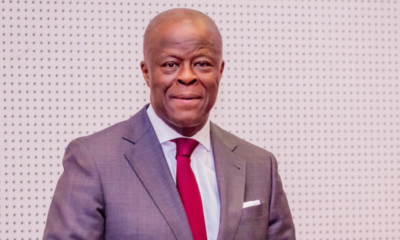

Nigeria’s finance ministry unveils system to monitor tax exemptions
-
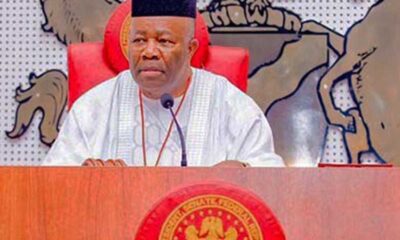

Nigeria: Senate President wants police rid of bad officers
-


Nigeria’s inflation hits 28-year high of 33.20%
-


Diesel gulping over 80% of Nigerian manufacturers’ profit, association claims
Strictly Personal
Air Peace, capitalism and national interest, By Dakuku Peterside
Published
13 hours agoon
April 16, 2024
Nigerian corporate influence and that of the West continue to collide. The rationale is straightforward: whereas corporate activity in Europe and America is part of their larger local and foreign policy engagement, privately owned enterprises in Nigeria or commercial interests are not part of Nigeria’s foreign policy ecosystem, neither is there a strong culture of government support for privately owned enterprises’ expansion locally and internationally.
The relationship between Nigerian businesses and foreign policy is important to the national interest. When backing domestic Nigerian companies to compete on a worldwide scale, the government should see it as a lever to drive foreign policy, and national strategic interest, promote trade, enhance national security considerations, and minimize distortion in the domestic market as the foreign airlines were doing, boost GDP, create employment opportunities, and optimize corporate returns for the firms.
Admitted nations do not always interfere directly in their companies’ business and commercial dealings, and there are always exceptions. I can cite two areas of exception: military sales by companies because of their strategic implications and are, therefore, part of foreign and diplomatic policy and processes. The second is where the products or routes of a company have implications for foreign policy. Air Peace falls into the second category in the Lagos – London route.
Two events demonstrate an emerging trend that, if not checked, will disincentivize Nigerian firms from competing in the global marketplace. There are other notable examples, but I am using these two examples because they are very recent and ongoing, and they are typological representations of the need for Nigerian government backing and support for local companies that are playing in a very competitive international market dominated by big foreign companies whose governments are using all forms of foreign policies and diplomacy to support and sustain.
The first is Air Peace. It is the only Nigerian-owned aviation company playing globally and checkmating the dominance of foreign airlines. The most recent advance is the commencement of flights on the Lagos – London route. In Nigeria, foreign airlines are well-established and accustomed to a lack of rivalry, yet a free-market economy depends on the existence of competition. Nigeria has significantly larger airline profits per passenger than other comparable African nations. Insufficient competition has resulted in high ticket costs and poor service quality. It is precisely this jinx that Air Peace is attempting to break.
On March 30, 2024, Air Peace reciprocated the lopsided Bilateral Air Service Agreement, BASA, between Nigeria and the United Kingdom when the local airline began direct flight operations from Lagos to Gatwick Airport in London. This elicited several reactions from foreign airlines backed by their various sovereigns because of their strategic interest. A critical response is the commencement of a price war. Before the Air Peace entry, the price of international flight tickets on the Lagos-London route had soared to as much as N3.5 million for the economy ticket. However, after Air Peace introduced a return economy class ticket priced at N1.2 million, foreign carriers like British Airways, Virgin Atlantic, and Qatar Airways reduced their fares significantly to remain competitive.
In a price war, there is little the government can do. In an open-market competitive situation such as this, our government must not act in a manner that suggests it is antagonistic to foreign players and competitors. There must be an appearance of a level playing field. However, government owes Air Peace protection against foreign competitors backed by their home governments. This is in the overall interest of the Nigerian consumer of goods and services. Competition history in the airspace works where the Consumer Protection Authority in the host country is active. This is almost absent in Nigeria and it is a reason why foreign airlines have been arbitrary in pricing their tickets. Nigerian consumers are often at the mercy of these foreign firms who lack any vista of patriotism and are more inclined to protect the national interest of their governments and countries.
It would not be too much to expect Nigerian companies playing globally to benefit from the protection of the Nigerian government to limit influence peddling by foreign-owned companies. The success of Air Peace should enable a more competitive and sustainable market, allowing domestic players to grow their network and propel Nigeria to the forefront of international aviation.
The second is Proforce, a Nigerian-owned military hardware manufacturing firm active in Rwanda, Chad, Mali, Ghana, Niger, Burkina Faso, and South Sudan. Despite the growing capacity of Proforce in military hardware manufacturing, Nigeria entered two lopsided arrangements with two UAE firms to supply military equipment worth billions of dollars , respectively. Both deals are backed by the UAE government but executed by UAE firms.
These deals on a more extensive web are not unconnected with UAE’s national strategic interest. In pursuit of its strategic national interest, India is pushing Indian firms to supply military equipment to Nigeria. The Nigerian defence equipment market has seen weaker indigenous competitors driven out due to the combination of local manufacturers’ lack of competitive capacity and government patronage of Asian, European, and US firms in the defence equipment manufacturing sector. This is a misnomer and needs to be corrected.
Not only should our government be the primary customer of this firm if its products meet international standards, but it should also support and protect it from the harsh competitive realities of a challenging but strategic market directly linked to our national military procurement ecosystem. The ability to produce military hardware locally is significant to our defence strategy.
This firm and similar companies playing in this strategic defence area must be considered strategic and have a considerable place in Nigeria’s foreign policy calculations. Protecting Nigeria’s interests is the primary reason for our engagement in global diplomacy. The government must deliberately balance national interest with capacity and competence in military hardware purchases. It will not be too much to ask these foreign firms to partner with local companies so we can embed the technology transfer advantages.
Our government must create an environment that enables our local companies to compete globally and ply their trades in various countries. It should be part of the government’s overall economic, strategic growth agenda to identify areas or sectors in which Nigerian companies have a competitive advantage, especially in the sub-region and across Africa and support the companies in these sectors to advance and grow to dominate in the African region with a view to competing globally. Government support in the form of incentives such as competitive grants ,tax credit for consumers ,low-interest capital, patronage, G2G business, operational support, and diplomatic lobbying, amongst others, will alter the competitive landscape. Governments and key government agencies in the west retain the services of lobbying firms in pursuit of its strategic interest.
Nigerian firms’ competitiveness on a global scale can only be enhanced by the support of the Nigerian government. Foreign policy interests should be a key driver of Nigerian trade agreements. How does the Nigerian government support private companies to grow and compete globally? Is it intentionally mapping out growth areas and creating opportunities for Nigerian firms to maximize their potential? Is the government at the domestic level removing bottlenecks and impediments to private company growth, allowing a level playing field for these companies to compete with international companies?
Why is the government patronising foreign firms against local firms if their products are of similar value? Why are Nigerian consumers left to the hands of international companies in some sectors without the government actively supporting the growth of local firms to compete in those sectors? These questions merit honest answers. Nigerian national interest must be the driving factor for our foreign policies, which must cover the private sector, just as is the case with most developed countries. The new global capitalism is not a product of accident or chance; the government has choreographed and shaped it by using foreign policies to support and protect local firms competing globally. Nigeria must learn to do the same to build a strong economy with more jobs.
Strictly Personal
This is chaos, not governance, and we must stop it, By Tee Ngugi
Published
7 days agoon
April 10, 2024
The following are stories that have dominated mainstream media in recent times. Fake fertiliser and attempts by powerful politicians to kill the story. A nation of bribes, government ministries and corporations where the vice is so routine that it has the semblance of policy. Irregular spending of billions in Nairobi County.
Billions are spent in all countries on domestic and foreign travel. Grabbing of land belonging to state corporations, was a scam reminiscent of the Kanu era when even public toilets would be grabbed. Crisis in the health and education sectors.
Tribalism in hiring for state jobs. Return of construction in riparian lands and natural waterways. Relocation of major businesses because of high cost of power and heavy taxation. A tax regime that is so punitive, it squeezes life out of small businesses. Etc, ad nauseam.
To be fair, these stories of thievery, mismanagement, negligence, incompetence and greed have been present in all administrations since independence.
However, instead of the cynically-named “mama mboga” government reversing this gradual slide towards state failure, it is fuelling it.
Alternately, it’s campaigning for 2027 or gallivanting all over the world, evoking the legend of Emperor Nero playing the violin as Rome burned.
A government is run based on strict adherence to policies and laws. It appoints the most competent personnel, irrespective of tribe, to run efficient departments which have clear-cut goals.
It aligns education to its national vision. Its strategies to achieve food security should be driven by the best brains and guided by innovative policies. It enacts policies that attract investment and incentivize building of businesses. It treats any kind of thievery or negligence as sabotage.
Government is not a political party. Government officials should have nothing to do with political party matters. They should be so engaged in their government duties that they literally would not have time for party issues. Government jobs should not be used to reward girlfriends and cronies.
Government is exhausting work undertaken because of a passion to transform lives, not for the trappings of power. Government is not endless campaigning to win the next election. To his credit, Mwai Kibaki left party matters alone until he had to run for re-election.
We have corrupted the meaning of government. We have parliamentarians beholden to their tribes, not to ideas.
We have incompetent and corrupt judges. We have a civil service where you bribe to be served. Police take bribes to allow death traps on our roads. We have urban planners who plan nothing except how to line their pockets. We have regulatory agencies that regulate nothing, including the intake of their fat stomachs.
We have advisers who advise on which tenders should go to whom. There is no central organising ethos at the heart of government. There is no sense of national purpose. We have flurries of national activities, policies, legislation, appointments which don’t lead to meaningful growth. We just run on the same spot.
Tee Ngugi is a Nairobi-based political commentator
EDITOR’S PICK


IMF predicts Nigeria’s inflation to drop to 18% by 2026
The International Monetary Fund (IMF) has predicted that inflation rate in Nigeria will drop to 23 per cent in 2025...


Air Peace, capitalism and national interest, By Dakuku Peterside
Nigerian corporate influence and that of the West continue to collide. The rationale is straightforward: whereas corporate activity in Europe...
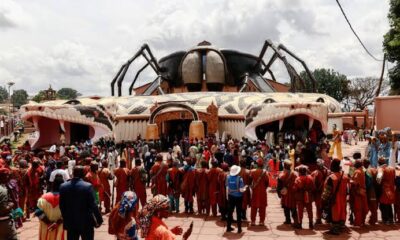

Cameroon opens museum dedicated to oldest, influential kingdoms
The Cameroonian government has inaugurated a historical museum which is dedicated to honouring its oldest and most influential kingdoms. Known...


South Africa’s crypto firm VALR gets licence to operate as asset service provider
South African leading cryptocurrency exchange trading firm, VALR, has been granted both Category I and Category II licence by the...
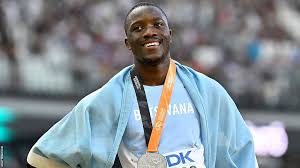

Botswana sprint star Letsile Tebogo speaks of ambition to match Usain Bolt as world’s greatest
Botswana sprint star, Letsile Tebogo, has talked of his ambition to match his idol, Usain Bolt, with the upcoming Paris...


$5m forfeited to govt in seized plane scandal that rocked Zambia
The Zambian government has been made $5 million richer following a court ruling that ordered the forfeiture of the sum...


Nigeria’s finance ministry unveils system to monitor tax exemptions
Nigeria’s Ministry of Finance has unveiled the Incentive Monitoring and Evaluation Platform (IMEP), a cutting-edge computer system meant to make...


Tanzania, Rwanda others recall Johnson & Johnson children’s cough syrup
As a safety step, drug regulators in Tanzania, Rwanda, and Zimbabwe have called back a batch of Johnson & Johnson...


Nigeria: Senate President wants police rid of bad officers
Nigeria’s Senate President, Godswill Akpabio, has asked the police to get rid of bad officers. He also promised that the...
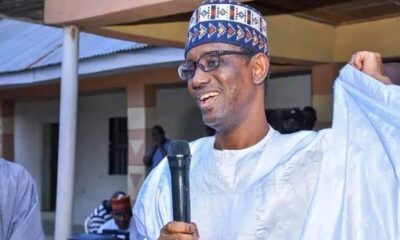

Nigerian govt claims over 1,000 kidnapped victims rescued without ransom payments
The Nigerian government claims that no fewer than 1,000 victims of abductions in the country have so far been rescued...
Trending
-

 Metro2 days ago
Metro2 days agoNigeria: EFCC recovers N32.7bn, $445,000 from fraud-riden Humanitarian ministry
-

 VenturesNow2 days ago
VenturesNow2 days agoDiesel gulping over 80% of Nigerian manufacturers’ profit, association claims
-

 Musings From Abroad2 days ago
Musings From Abroad2 days agoWHO says Nigeria is the first country to use new meningitis vaccine
-
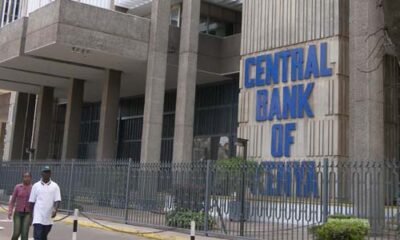
 Musings From Abroad2 days ago
Musings From Abroad2 days agoWorld Bank supports Kenyan central bank’s interest rate hike


